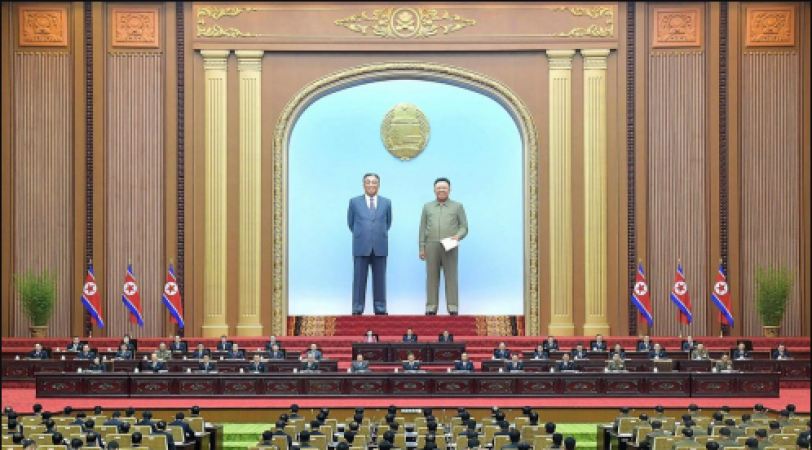
Seoul: As leader Kim Jong Un pushes for an aggressive expansion of his nuclear arsenal amid stalled diplomacy, North Korea's rubber-stamp parliament has approved a budget that allows for high levels of defense spending despite economic difficulties. maintains.
According to reports in state media, Kim did not attend the two-day session of the Supreme People's Assembly that ended on Wednesday. In his account of the meetings on Thursday,
Pyongyang's official Korean Central News Agency made no mention of any remarks made by assembly members toward the United States or South Korea.
Also Read: protests and strikes test French retirement age increase
The meeting comes weeks after Kim called for mass production of battlefield tactical nuclear weapons, an "exponential increase" in the number of nuclear warheads aimed at "enemy" South Korea, and more sophisticated intercontinental ballistic missiles capable of reaching the US mainland Was.
His remarks at a key political conference in December highlighted a growing nuclear standoff with the United States and its allies in Asia after he encouraged North Korea to conduct a record number of weapons tests in 2022.
The North conducted a series of tests, portrayed as simulated nuclear strikes on South Korean and US targets last year, firing more than 70 missiles, including several ICBM launches.
According to analysts, Kim's offensive weapons build-up and nuclear doctrine are meant to persuade the United States to recognize North Korea as a nuclear power and negotiate economic and security concessions from a position of strength.
Also Read: China claims that "some Western media" have a biassed view of COVID-19
According to KCNA, legislators predicted that total state spending would increase by 1.7% this year, but made no mention of the actual size of the budget.
To support efforts to "further strengthen war deterrence both in quality and quantity" and "safeguard the dignity and security of the country and the people",
According to KCNA, members of the assembly allocated 15.9% of this year's national budget to defense expenditure, the same proportion as last year.
Given the poor quality of the scant data North Korea provides, it is difficult to estimate how much money it will spend on its military capabilities.
North Korea will spend about $4 billion on defense in 2019, accounting for 26% of its estimated GDP, the highest percentage of 170 countries the US State Department looked at in its 2021 World Military Expenditures and Arms Transfers report. ,
North Korea is attempting to revive a failing economy that has been hurt by mismanagement, US-led sanctions on Kim's nuclear ambitions and border closures due to COVID-19, according to KCNA's report on the assembly meetings.
Finance Minister Ko Jong-bom expressed sadness over unexplained deficiencies in collecting taxes from state-owned enterprises. According to KCNA, he urged economic activists to strengthen their "ideological resolve" and to prioritize the interests of the whole country over the interests of their individual units.
A new law protecting a "cultured" dialect unique to the Pyongyang region, the country's capital, was also approved by the assembly, in what appears to be the most recent effort to counter South Korean and other outside influences.
He also talked about stepping up surveillance efforts by the Central Public Prosecutor's Office to create a "sense of revolutionary law-abiding", highlighting how Kim's government still tightens its grip on its citizens despite worsening economic difficulties. Still working.
When Kim last spoke at the gathering in September, he firmly declared that his country would never give up its nuclear arsenal, which he clearly sees as its greatest hope for survival.
Members of the Assembly then passed legislation authorizing preemptive nuclear strikes in various circumstances where it might endanger its leadership, including conventional conflicts or conflicts that would not necessarily lead to war.
South Korea, Japan and other allies of the United States are trying to strengthen their defense posture in response to the growing nuclear threat from North Korea.
South Korean President Yoon Suk Yeol said in an interview with The Associated Press last week that his country is in talks with the Biden administration about a joint military plan that could include US nuclear assets.
Next month, the allies intend to hold a tabletop exercise to fine-tune their response in the event of North Korea using a nuclear weapon.
Yoon's administration has also declared that it will push Washington to regularly establish strategic military assets closer to the Korean Peninsula.
Also Read: Transgender men in Pakistan seek acceptance and visibility
By adopting a new national security strategy in December that includes objectives such as acquiring preemptive strike capabilities and cruise missiles in response to growing threats from North Korea, China and Russia, Japan departed from its strictly self-defense-only postwar doctrine. important departure.